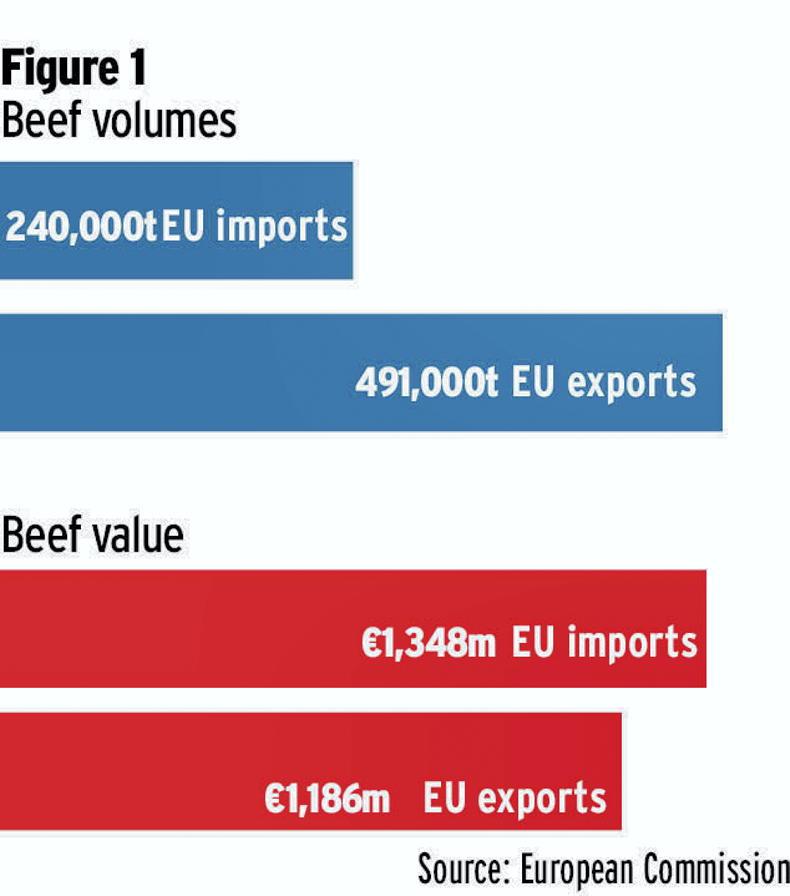EU vice-president and trade commissioner, Valdis Dombrovskis, presented a Communication on EU Trade policy at the end of last week, outlining EU ambitions for global trade policy.
It coincides with the World Trade Organisation (WTO) appointing Ngozi Okonjo-Iweala to head the organisation as it attempts to reassert itself as the governing body for global trade. The ambition is to have an open, sustainable and assertive global trade policy, operating to a global rule book.
The vice-president and trade commissioner also identifies that future trade growth will take place outside the EU with Asia currently in rapid development and huge potential in Africa. The EU has put down a marker for a leadership role in a rules-based template for global trade at a time when the US is more inward looking.
These global ambitions of the EU fit with many sectors of the Irish economy but, unfortunately for beef and sheep farmers, they make economic sustainability more difficult. EU rules for farming already make Europe the most expensive area in the world to produce beef or sheepmeat.
In the absence of an EU impact assessment, the USDA has estimated that the new Farm to Fork strategy that will underpin the next CAP will cause a reduction of 16% in farm incomes for EU farmers.
If the EU succeeds in its ambition of having EU production policy adopted by trading partners or ultimately at a global level, then it becomes a different picture entirely.
EU production
EU production standards, applied universally, would have the effect of increasing farm incomes but with reduced production and higher prices, food prices would jump 89% and a further 185m people would become exposed to food insecurity. This wouldn’t be a problem in the wealthy communities of the EU, US or other wealthy parts of the world but would be an issue for the poorest people in African and Asian countries.
This is the reality of achieving the perfect world where EU production standards become the global standard. It would be fine for farmers because after decades of food spending falling in household budgets, it would reverse the trend and start rising again.
However, while the EU may pursue this policy, it is difficult to ever envisage the US adopting it and giving up its science-based approach to agriculture which gives US farmers a serious productivity advantage over their EU counterparts. It is similar with South America. It will soon be two years since the Mercosur trade agreement was signed, which promised replanting of the Amazonian rainforest, but that hasn’t happened.
Global trade
Global trade means goods are produced in the parts of the world where it is most efficient to do so, irrespective of how that efficiency is achieved. Therefore, we find that a vast amount of labour-intensive consumer goods from technology to fashion are produced in Asia. New Balance, the most American of brands for sportswear, uses Vietnam for the manufacture of a range of running shoes.
It is the same with beef and sheepmeat. Growth hormones give US farmers a competitive advantage in beef production over their EU counterparts. The EU blocks hormone-treated beef but with Farm to Fork the EU will raise the bar again for Irish and EU farmers. Parallel to this, trade negotiations are at an advanced stage with Australia and New Zealand, while a Mercosur trade deal waits to be ratified. This will have the effect of further squeezing Irish and EU beef and sheep producers if the already shrinking EU market is opened to further supply from lower-cost producing regions.
Volumes and values
Figure 1 shows that EU beef export volumes from the EU greatly exceed imports but when we look at export and import values, EU imports are greater than exports. This is because the EU exports lower value parts of the carcase and imports higher-value cuts, particularly steak meat.

The globalisation of trade in beef will squeeze the value of this further, to the point where production in Europe is no longer viable.
Of course, if beef production in Europe and Ireland wasn’t viable, then a consequence would be a reduction in cattle dedicated to beef production. If that happened, it would help Europe achieve a reduction in emissions through effectively outsourcing beef production to the rest of the world. This is not a global solution to a global problem but it is one that would have devastating consequences for Irish family farms.






 This is a subscriber-only article
This is a subscriber-only article










SHARING OPTIONS: